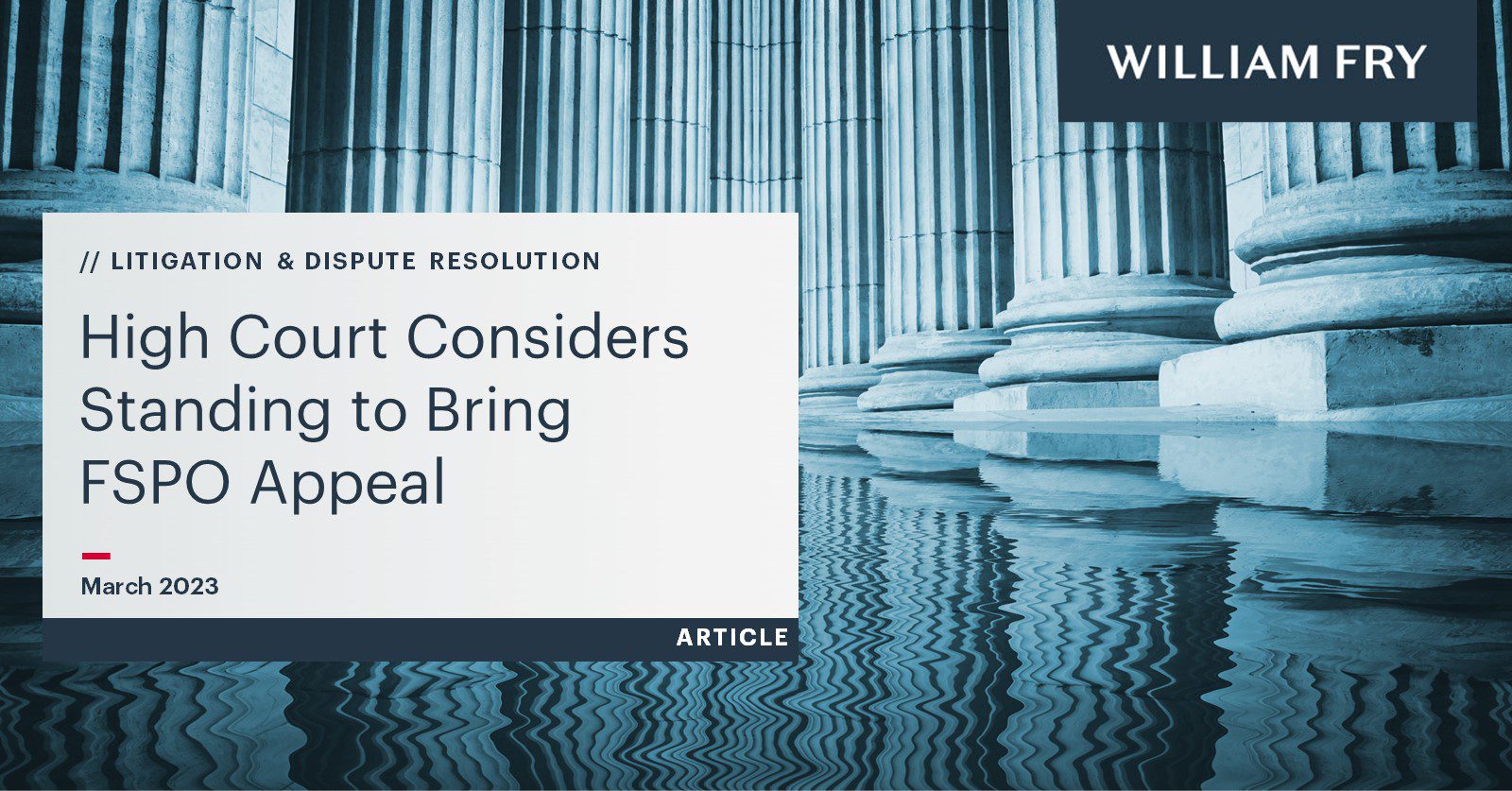The FSPO Decision
The FSPO dismissed a complaint made by an insured against their insurance provider (Decision). The insurance provider (Appellant) declined cover in respect of business disruption at the insured premises during the Covid-19 pandemic. The FSPO decided three points of contractual interpretation in favour of the insured, but ultimately held that the insured had failed to produce evidence that there was a likelihood that Covid-19 would occur at the insured premises.
In an unusual turn of events, the successful Appellant appealed to the High Court, Chubb European Group SE v FSPO [2023] IEHC 74.
High Court Appeal
Although the Appellant was the successful party in terms of the formal outcome before the FSPO, it maintained that the Decision contained potentially prejudicial findings. Specifically, the Appellant contended that the Decision gave a particular interpretation to wording in an Insurance Policy (Policy) that was used in other insurance policies entered into by the Appellant. The Appellant also submitted that the Decision triggered certain obligations under the Central Bank’s supervisory framework for business interruption insurance. This, it argued, obliged the Appellant to carry out a beneficial impact assessment of the Decision to identify other persons in similar positions to the insured.
The FSPO submitted that the appeal was inadmissible where the Financial Services and Pensions Ombudsman Act 2017 (Act), does not allow for a “winner’s appeal”.
Precedent and FSPO Decisions
Simons J found that he did not need to resolve a question of whether the doctrine of precedent applies to FSPO decisions. Rather, the FSPO must act reasonably, which implies a general obligation to act consistently in deciding cases. Simons J found that whilst a previous decision is not determinative of a subsequent complaint, as there may be distinguishing grounds to justify a departure, FSPO decisions are of “persuasive” precedent.
Substance of Appeal
The FSPO argued that only the outcome of a decision was appealable. This was rejected, having regard to the wording of section 60 of the Act, under which the concept of a “decision” is given a wide meaning. Applying, section 60(3), the concept of a “decision” includes
- the decision itself,
- the grounds for the decision, and
- any direction given by the FSPO.
Simons J found that the statutory right of appeal under the Act embraces the outcome, and the grounds for that outcome.
Standing
The FSPO’s substantive argument was that a successful party could not appeal to the High Court. The FSPO had sought to rely on an earlier ex tempore judgment of Kearns P to establish that this point was previously decided by the High Court, and was binding in this appeal. However, as there was no formal record of the judgment, the Worldport jurisdiction did not apply. Simons J, therefore, held that he had to adjudicate on the issue, and having regard to the wording of the Act, he dismissed the argument that a successful party to an FSPO decision cannot appeal to the High Court. It would be illogical to interpret the Act such that a right of appeal against certain FSPO findings (for example, on contractual interpretation) which affected a party’s interests, was only available if the overall outcome of the complaint went against that party.
The FSPO argued that an appeal by a successful party runs contrary to the purpose of the FSPO scheme i.e., to keep the process out of the courts. Simons J dismissed this argument, cautioning that legislation cannot be readily interpreted as being so confined. The nature of a statutory appeal depends on the wording of the underlying legislation rather than a presumed intention to restrict a right of access to the courts.
Findings
Simons J concluded that the FSPO committed a serious and significant error in his approach to contractual interpretation. Firstly, in interpreting the Policy without applying the proper principles of contractual interpretation as most recently set out in Brushfield Ltd (T/A The Clarence Hotel) v Arachas Corporate Brokers Ltd [2021]. Secondly, in not applying fair procedures, by not properly engaging with submissions made by the Appellant and failing to provide any reasons for not following those submissions.
Simons J concluded that it would be inappropriate for him to determine the questions of contractual interpretation. He continued that
The court will not, therefore, be taking a blue pencil, as it were, to the impugned decision and substituting the court’s own findings for those of the [FSPO].
Simons J granted an order setting aside the Decision, with no order of remittal (although the latter part was only a provisional view, and Simons J will hear the parties further on this point). This means that the “offending findings” made against the Appellant are expunged and the Decision cannot be relied upon as a precedent or to trigger the Appellant’s obligations under the Central Bank’s supervisory policy.
Impact
It does not follow, as a matter of course, that the judgment can be read across other statutory schemes or appeals. The nature and extent of statutory appeals depend on the wording of the underpinning legislative provisions. A distinguishing feature from other statutory appeals is the extensive powers of the High Court in disposing of appeals from the FSPO.
The case featured novel points around the substance of a statutory appeal from the FSPO to the High Court, and who has standing to bring such an appeal. The findings of Simons J will be cautiously welcomed by financial service providers who, although ultimately successful in an FSPO complaint, can point to potential prejudice by its decision. Superficially at least, it appears paradoxical that a successful party has a decision overturned, and remains to be seen whether the provisional view of Simons J on remitting the case will change on further submissions.
For further information, please contact Derek Hegarty or Hilary Rogers or any member of our Financial Regulation team.
Contributed by Gail Nohilly & Joanne Ryan


